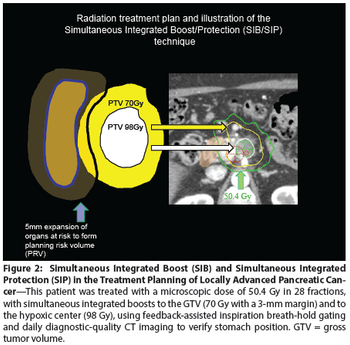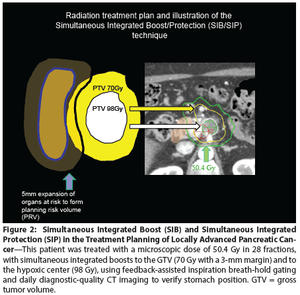
Five randomized trials involving patients with locally advanced pancreatic cancer illustrate most clearly the substantial degree to which standard therapies are limited in their effectiveness.

Your AI-Trained Oncology Knowledge Connection!


Five randomized trials involving patients with locally advanced pancreatic cancer illustrate most clearly the substantial degree to which standard therapies are limited in their effectiveness.

The prognosis of patients with biliary cancers is poor. Although surgery is potentially curative in selected patients, local recurrence is a common pattern of failure. Adjuvant or neoadjuvant radiation therapy improves local control and possibly survival. In locally advanced patients, radiation therapy provides palliation and may prolong survival. Concurrently administered chemotherapy may further enhance these results. Newer radiation therapy techniques, including intraluminal transcatheter brachytherapy, intraoperative radiation therapy, intensity-modulated radiation therapy, and three- and four-dimensional treatment planning, permit radiation dose escalation without significant increases in normal tissue toxicity, thereby increasing the effective radiation dose. Preliminary results of studies employing hepatic transplantation with radiation therapy are encouraging. Although these new approaches hold promise, the prognosis in patients with biliary cancers remains poor, and the integration of novel therapeutic strategies is indicated.

Although in centers where pancreatectomy is performed frequently,associated morbidity and mortality rates have improved, long-term outcomesin pancreatic adenocarcinoma patients remain poor when surgeryis the sole therapeutic modality. The impact of adjuvant chemotherapyon survival in patients with localized pancreatic cancer remainsincompletely defined. The European Study Group for Pancreatic Cancer(ESPAC)-1 trial has suggested that overall survival rates are superiorwhen chemotherapy is added to surgery, even when regimens believedto be relatively ineffective in the treatment of advanced diseaseare used. The role of radiotherapy given with chemotherapy is alsounresolved, but chemoradiation continues to receive consideration inthe multimodality approach to localized pancreatic cancer. Enhancedcollaboration and increased involvement by pancreatic surgeons havehelped in the recruitment of pancreatic cancer patients for large-scalerandomized clinical trials in Europe and the United States. Many newerchemotherapeutic agents with efficacy in gastrointestinal cancers haveyet to be investigated in the adjuvant and neoadjuvant settings.

Over the past decade, patients with locally advanced rectal cancer at The University of Texas M. D. Anderson Cancer Center have been managed with preoperative chemoradiation. Patients achieving a complete clinical response to preoperative chemoradiation have had better pelvic tumor control, sphincter preservation, and overall survival than those with gross residual disease. Some patients achieving a complete clinical response have even had rectal-preserving surgery (full-thickness local excision).

Recent prospective and retrospective data suggest that the use of multimodality therapy combining pancreaticoduodenectomy with postoperative adjuvant chemotherapy (fluorouracil) and external-beam radiation

Protracted infusions of 5-fluorouracil (5-FU) combined with pelvic radiotherapy have been associated with improved survival and decreased local and distant metastases in the adjuvant therapy of rectal cancer. However,

Published: July 1st 1999 | Updated:

Published: June 1st 2001 | Updated:

Published: May 2nd 2002 | Updated:

Published: August 15th 2015 | Updated:

Published: July 1st 2006 | Updated:

Published: March 1st 2005 | Updated: